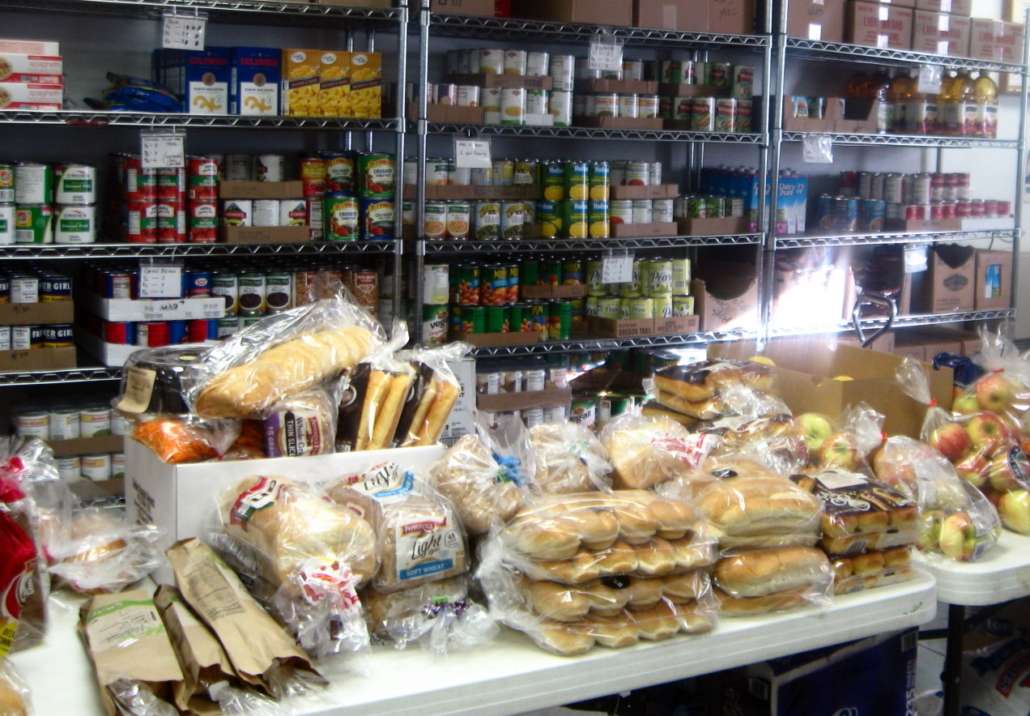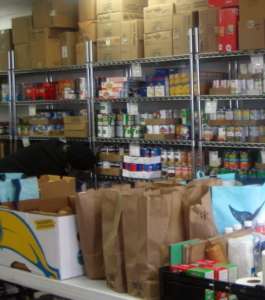Area food pantries: people helping people
 Text and photo by Roberta Barnes
Text and photo by Roberta Barnes
It is that time of year when people need help shoveling their walkways and heating their homes, but something that everyone needs at all times is nutritious food. Illnesses and accidents do not care about age, occupation, or gender. Misfortune can hit individuals or families at any time. Businesses and companies can go out of business. At unexpected times, individuals or families can be in a situation where resources have been stretched beyond the point of trying to eat balanced meals.
Neighbors, relatives, and others in the community have been helping for decades, but sometimes people are struggling themselves or do not know that a person or family needs help. The nice thing is that there are nonprofit organizations formed and supported by the community, who can help in our community, and our State, those that do not have the nutritious foods needed to keep their body and mind functioning during this stressful season.
Last week, several local food pantries in China, Jefferson, Windsor, Vassalboro and Winslow took time to talk with me. These volunteer-driven initiatives are located in spaces where businesses have closed down, in renovated town garages, and in churches. Some even operate mobile trailers that can be moved to different locations.
Each of the volunteers who spoke with me expressed compassion and a willingness to give without judgement. They are able to operate thanks to generous donations by local businesses, farms, and individuals, plus countless hours by volunteers. Their work is filling a need by helping supply needed nutritional foods.
How and when you can receive needed food varies with location. Some pantries are open one or two days a week, others are open only once or twice a month. In some locations the space is too small for people to walk into the area where the food is safely stored. In those cases, once a person checks off the list of food needed, volunteers bring those foods to the person’s vehicle. Other organizations have a space large enough that clients can walk through in single file and do their own shopping.
I heard from Jefferson food pantry, located in St. Giles church (207-315-1134), and Windsor food bank in a section of the Windsor Town Hall garage (207-445-9030), that in the case of an emergency situation they have delivered the needed food to a home. All organizations distributing food in Maine are focused on helping people in their communities have the food they need to stay healthy.
In October 1929 when Wall Street crashed and 15 million people were unemployed by 1933, there were no safety nets in place.
Today we are lucky to have help in place. But getting nutritious foods to the pantry locations, correctly storing perishable foods, and safely handling all foods, requires numerous steps from many different people.
Donations and volunteer work are the most important aspect in providing these additional safety nets, and in continuing to keep them available for those people who at certain times cannot buy food, or are having trouble with other basic needs.
 The Federal Emergency Food Assistance Program, or TEFAP, began with donation efforts of surplus foods, such as cheese, by the USDA in late 1981. Foods from this program are given to each State based on the number of unemployed persons and the number of people with incomes below the poverty level. It is then given to the organizations that directly serve the public and submit all the correct forms. The receiving and passing out of these foods requires detailed paperwork completed by volunteers. This is just part of the effort that goes on behind the scenes that many people do not see.
The Federal Emergency Food Assistance Program, or TEFAP, began with donation efforts of surplus foods, such as cheese, by the USDA in late 1981. Foods from this program are given to each State based on the number of unemployed persons and the number of people with incomes below the poverty level. It is then given to the organizations that directly serve the public and submit all the correct forms. The receiving and passing out of these foods requires detailed paperwork completed by volunteers. This is just part of the effort that goes on behind the scenes that many people do not see.
In 1981, the Maine nonprofit organization Good Shepherd Food Bank was formed in Auburn through donations of individuals, retailers, and large food companies in Maine. The small grassroots effort has grown, expanding to Hamden and delivering foods to organizations throughout Maine that are contracted with them.
Good Shepherd’s purchasing power and relationships with wholesalers allow these organizations to use the donations they receive to purchase food at a fraction of the cost they would pay through standard retailers. Five dollars can result in thirty pounds of food. Because safely handling and storing perishable foods is important, annually each organization is inspected to be sure all foods are handled safely. Everything is carefully monitored and that requires accurate paperwork.
Donations made to Good Shepherd Food Bank and other organizations come from many sources. One of the donating companies, Hannaford Bros. Co., established a reclamation center to facilitate the process of distributing products to Good Shepherd and other food banks. In certain stores you may find programs inviting customers at the register to donate money or buy boxes of food staples for local pantries.
Speaking with volunteers in Windsor, I heard about a food bake sale that resulted in major funding for Windsor Food Bank Inc. Farms in some communities also donate various veggie and protein foods that are properly packaged, from late July sometimes into November.
When China Food Pantry was established in 1992 (1320 Lakeview Drive), it started by connecting with local stores for over-stocked and other foods that could not be put on the grocery shelves even though they were still safe to eat. With stores being willing to donate some foods, similar pantries in Albion, Palermo, Windsor, Jefferson and Vassalboro quickly followed. The volunteers in these locations drove to pick up food in various locations, including farms and Good Shepherd in Auburn. Today Good Shepherd delivers to those contracted with them.
The joy that pets of all sizes can bring into a home is obvious. Pets also are great listeners, help with depression and loneliness, can relieve stress, increase your physical anxiety, help you see the beauty around you and much more. But pets need pet food to continue to help the people they live with. Some of the volunteers shared with me that they will personally go to retailers and purchase pet food that can be picked up with the other needed foods at the organization’s location.
While I was not able to connect with all local organizations providing food at no charge, The Town Line’s website has a list of pantries and phone numbers here. You can also find the location by calling or dropping into the town office in your community.
In Vassalboro, there is the Vassalboro Food Station on Rte. 32 open on Thursdays from 11 a.m. to noon. The Winslow Community Cupboard also distributes food at The Mill, in Vassalboro, Wednesdays 4 – 7 p.m. and Sundays 10 a.m. – 3 p.m.
Winslow Community Cupboard also serves people in communities other than Winslow, which you can see by visiting their website. They are at the Winslow Congregational Church, 12 Lithgow Street, the second and fourth Thursday each month from noon – 3 p.m., and from 5 – 7 p.m.
As you are reading, these organizations require many volunteers to make all of this happen. Being a volunteer or donating can be extremely rewarding as you see the thankful faces of those receiving. If you would like to donate or volunteer, either contact your local food bank, food pantry, community cupboard, or town office.
Roberta Barnes is a freelance contributor to The Town Line.
Responsible journalism is hard work!
It is also expensive!
If you enjoy reading The Town Line and the good news we bring you each week, would you consider a donation to help us continue the work we’re doing?
The Town Line is a 501(c)(3) nonprofit private foundation, and all donations are tax deductible under the Internal Revenue Service code.
To help, please visit our online donation page or mail a check payable to The Town Line, PO Box 89, South China, ME 04358. Your contribution is appreciated!





Leave a Reply
Want to join the discussion?Feel free to contribute!